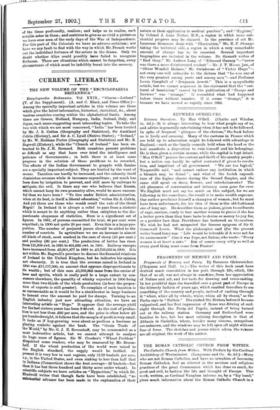CURRENT LITERAT URE.
THE NEW VOLUME OF THE " ENCYCLOPAEDIA BRITANNICA."
' Encyclopaedia Britannica. Vol. XXIX., "Glarus—Jutland" (V. of the Supplement). (A. and C. Black, and Times Office.)— Among the specially important articles in this volume are those which give the latest information, historical, statistical, &c., about various countries coming within the alphabetical limits. Among -these are Greece, Holland, Hungary, India, Ireland, Italy, and Japan, each name suggesting most interesting topics. To take the two with which we are most concerned, "India" has been treated by ldr. J. S. Cotton (Geography and Statistics), Sir Auckland Colitin (History), and Sir A. C. Lyall (Native States) ; " Ireland," by Mr. W. Haldane Porter (Geography and Statistics) and Mr. R. Bagwell (History), while the "Church of Ireland" has been en- trusted to Dr. J. H. Bernard. Both countries present problems at difficult as any that have ever tried the intelligence and patience of Governments ; in both there is at least some progress in the solution of these problems to be recorded The efforts of the Indian Government to grapple with famine are a specially important subject. They are limited by the want of means. Taxation can hardly be increased, and the calamity itself diminishes revenue while it increases expenditure ; yet much has been done by irrigation to prevent, and still more by railways to mitigate, the evil. Is there any one who believes that Russia, which cannot keep its own peasantry alive, would be more success- ful than we have been ? " To live under British administration, when at its best, is itself a liberal education," writes Sir A. Colvin And yet there are those who would recall the rule of the Great Mogul! In Ireland it is always a relief to pass from a rhetoric, which is meant to do anything rather than enlighten to the dis- passionate eloquence of statistics. Here is a significant set of figures. In 1881, of persons committed for trial, 46 per cent. were acquitted ; in 1900 not quite 20 per cent. Even this is a largepro- portion. The number of perjured jurors should be added to the number of convicts. In agriculture we see an increase in almost all kinds of stock, most marked in the case of sheep (25 per cent.) and poultry (80 per cent.) The production of butter has risen from 121,309 cwt. in 1891 to 401,690 cwt. in 1901. Railway receipts have increased from £2,601,477 in 1881 to £3,733,626 in 1900. It is not within Mr. Bagwell's province to discuss the financial relations of Ireland to the United Kingdom, but he indicates his opinion not obscurely. It is true that the revenue raised in Ireland in 1900 was 211,117,500, an amount that appears disproportionate to its wealth ; but of this sum 25,935,902 came from the excise of beer and spirits, which is really paid to a large extent by con- -Burners elsewhere, the quantity of whisky exported in 1900 being more than two-thirds of the whole production (in beer the propor- tion of exports is still greater). To complain of such taxation is as unreasonable as it would be for a stockbroker in large business to lainent over the amount he paid for stamps. Turning to an English industry just now attracting attention, we have an interesting article on "Hope." It appears that the average yield for thelast sixteen years has been 8'40 cwt. As the cost of produc-, tion is not less than £86 per acre, and the price is often below £5 per hundredweight, it follows that the margin of profit is very small. It looks as if hop-growing were about as perilous a business as Pining roulette against the bank. The "Grain Trade of the World;" by Mr. G. J. E. Broomliall, may be commended as a most instructive article, but we cannot attempt to analyse its huge mass of figures. Sir W. Crookes's "Wheat Problem" disquieted some readers, who may be reassured by Mr. Broom- ball. If the wheat production of the world were raised to the English standard, the supply would be trebled. At present it is very low in vast regions, only 12-29 bushels per acre, cf., in the United States, and even sinking to less than half that 5a Indiana (Connecticut shows the best average-20 bushels—but them it has but three hundred and thirty acres under wheat). In scientific subjects we have articles on "Hypnotism," in which Dr. Shadwell writes that though facts have been established, "no sabatantial advance has been made in the explanation of their nature or their application to medical practice" and " Hygiene," by Colonel J. Lane Netter, M.D., a region in which more sub- stantial progress may be claimed. In the province of art Mr. Laurence Housman deals with "Illustration," Mr. E. F. Strange taking the technical side, a region in which a very remarkable amount of change has to be recorded. Several important biographies are included in the volume. Dr. Garnett writes of " Earl Grey," Mr. Andrew Lang of " Edmund Gurney "—" never was there a more disinterested student"—Mr. J. T. Morse, jun., of "Oliver Wendell Holmes," Mr. Swinburne of " Victor Hugo"— not every one will subscribe to the dictum that " he was one of the very greatest among poets and among men"—and Professor Lewis Campbell of " Benjamin Jewett." This is a sympathetic article, but we cannot acquiesce in the statement that the " out- burst of fanaticism" caused by the publication of "Essays and Reviews" was "strange." It resembled what had happened before times without number. If it seems " strange," it is because we have moved so rapidly since 1860.










































 Previous page
Previous page